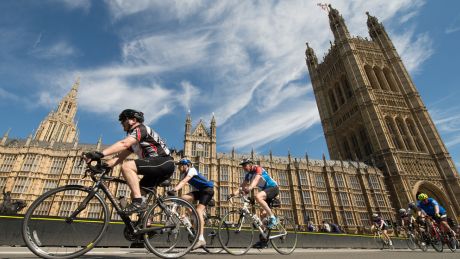What To Eat And Drink To Ace RideLondon
It’s one of the biggest events in the amateur cycling calendar. Here’s how to nail your nutrition

Did you bag a RideLondon place? Lucky you. The massively oversubscribed race should be on every active person’s bucket list, and since you’ll be back in the lottery next year, it’s worth getting all your prep right, whether you’re riding the 100-mile version or the shorter Prudential RideLondon-Surrey 46. We asked Charlotte Kennedy, nutritionist for Etixx Sports, for her fueling recommendations before, during and after the race.
The Night Before
What To Eat
It might sound boring, but keep it as simple as possible. A plain dinner using fresh ingredients should minimise the risk of any digestion issues. The meal should contain a large portion of carbohydrate with a portion of protein, such as salmon with sweet potato or spaghetti with lean mince. I recommend minimising fibre intake – for instance, replacing wholemeal carbohydrates with their white alternatives, to further avoid any digestion issues.
Have a snack high in carbohydrate before going to bed – something like banana and peanut butter on rice cakes or a high carbohydrate sports drink such as the Etixx Energy Load. However, be careful not to overindulge in carbohydrate – you’ll only wake up on event day feeling bloated and heavy.
What To Drink
Even the night before the race, you should make sure you’re hydrated by sipping water frequently. Carry around a bottle with you wherever you go and make a conscious effort to drink enough. You really don’t want to start race day in a dehydrated state as it’ll put you at an immediate disadvantage. To make sure you’re hydrated, monitor your urine colour. Urine should be a light straw colour for optimal hydration.
The Morning Of The Race
What To Eat
Stick to what you know. Have a breakfast that you’re used to eating before training. This should be high in carbohydrate to top up fuel stores, and could include a little bit of protein and fat to help keep you full. A good example would be porridge with banana and peanut butter. Make sure you eat two to three hours before the race starts.
What To Drink
Start your day with plenty of fluid to maintain hydration. Sip water frequently and aim to drink about 500ml of fluid around an hour before the start. This could be a combination of water and isotonic drink to give you some fuel as well as hydrating you. If you’re used to a morning coffee, you don’t have to miss out – caffeine may have some performance benefits so having a small cup won’t hurt. If you’re not used to having caffeine, though, don’t start experimenting for the first time on the morning of an event.
During the Race
What To Eat
By now you should have a plan in place of what you are going to eat and when, but there are still some last-minute things you can think about. Plan to be as self-sufficient as you can. Don’t rely on food stations, as you can never guarantee what will be available and how busy they will be. When you do get to feed stations, try to stick to your plan as much as possible and be careful what you indulge in. Look for foods high in carbohydrate and don’t overeat, especially with fat and protein – small sandwiches are good.
Get the Coach Newsletter
Sign up for workout ideas, training advice, reviews of the latest gear and more.
Consider taking some savoury food with you as well to stop you getting sick of the sweet carbohydrate foods – a bagel with peanut butter or Marmite is good.
Keep some quick-release carbohydrate sources such as energy gels in your pocket at all times. These will be really useful if you start to feel like you’re bonking because they can provide energy within ten minutes. Remember you should be aiming to eat around 60g of carbohydrate per hour and should make an effort to eat something small every 20-30 minutes.
Use your real food options nearer the start to give your body time to digest them and save the energy products for when you need a quick boost. Whenever you eat during exercise, sip a little bit of water to help it digest.
What To Drink
Aim to drink between 500ml and a litre of fluid per hour. If the weather is hot, you will have to dramatically increase the amount of fluid you drink compared with what you are used to, so make a conscious effort to drink more. Staying hydrated during an endurance event is achieved using a combination of water and isotonic drinks, which also provide you with carbohydrates and replace lost electrolytes. Aside from isotonic drinks you could also use an electrolyte tab dissolved in water to replace lost sodium.
After The Race
What To Eat
Recovering from RideLondon should begin as soon as you get off the bike. Aim to consume carbohydrates and protein as soon as you can. A great example here would be a recovery shake such as the Etixx Recovery Shake. These are very easy to drink and provide you with lots of nutrients quite quickly. Mix them with water or milk to help with rehydration as well.
Try to have a full meal containing a portion of carbohydrate, a portion of protein and some vitamins and minerals about two hours after finishing – think chicken with rice and vegetables. Although it might be tempting to indulge in lots of treats, the better you are with your post-ride nutrition the easier your recovery should be… but help yourself to a few – you have just completed a very tough challenge!
After you finish you will need to replace all the fluid you have lost through sweating. It can take a long time to reach optimal hydration levels again and therefore you should make an effort to drink water up to four hours after you finish. Monitor your urine colour to know when you are hydrated again. Although you’re definitely entitled to indulge in your celebratory post-ride beer, don’t rely on alcohol for rehydration.
Charlotte Kennedy is a nutritionist for Etixx Sports

Jonathan Shannon was the editor of the Coach website from 2016 to 2024, developing a wide-ranging experience of health and fitness. Jonathan took up running while editing Coach and used the training plans on the site to run a sub-40min 10K, 1hr 28min half marathon and 3hr 6min marathon. He’s an advocate of cycling to work and is Coach’s e-bike reviewer, and not just because he lives up a bit of a hill. He also reviews fitness trackers and other workout gear.
